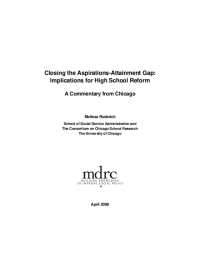Closing the Aspirations-Attainment Gap
Implications for High School Reform
A Commentary from Chicago
The national consensus is that many public high schools, especially in urban areas, are the weakest link in the American education system, plagued by high rates of school dropout, persistently low performance, and disengaged students. The hope on the horizon is that the urban high school has become a central focus of reform. In this commentary, Melissa Roderick, Co-Director of the Consortium on Chicago School Research at the University of Chicago, asks: What should educators and policymakers be trying to accomplish as they reform high schools?
Ask any high school student in Chicago today what he wants out of high school, Roderick says, and the answer is almost without fail, “to graduate and go to college.” This is a good starting place for high school reform. Closing the gap between students’ rising aspirations and their educational attainment requires that high schools reduce dropout rates and begin to view college preparation and attendance as primary goals and important measures of their performance.
Dropout rates in urban school systems are driven largely by early academic difficulty in high school. Research from Chicago and recent results from MDRC’s evaluation of the Talent Development High School model indicate that schools can make substantial progress by targeting their efforts on students’ successful transition to high school — improving their skills before and initially upon entering high school — and reducing high rates of ninth-grade course failure.
Getting students to graduate from high school, however, will not make them college-ready if high schools do not help them to acquire the skills and credentials they need. Data from a new study of the transition to college among students in Chicago show that low levels of college readiness are seriously constraining their access to and performance in college. Roderick argues that strategies to change this must begin by linking together efforts to improve instruction, increase students’ engagement and performance, and provide better guidance for students in college search, planning, and application. Instructional programs should develop not only students’ content knowledge and basic skills, but also their precollegiate academic skills (writing and problem solving) and their noncognitive skills (performance norms, study skills, and learning strategies) — areas that have seldom been the domain of high school teachers.
Will the move to test-based accountability lead educators to focus on the set of outcomes, skills, and supports needed for high schools to increase students’ on-track rates, grade point averages, and critical college-readiness skills? Roderick concludes that a singular focus on test-based accountability will most likely devalue a focus on grades, precollegiate academic skills, and noncognitive skills, in favor of an emphasis on the basic skills and content knowledge that are measured on tests. It will most certainly take resources away from college guidance and preparation and preventing ninth-grade failure. Test scores might improve, but at the high school level, this will lead to illusory progress.







